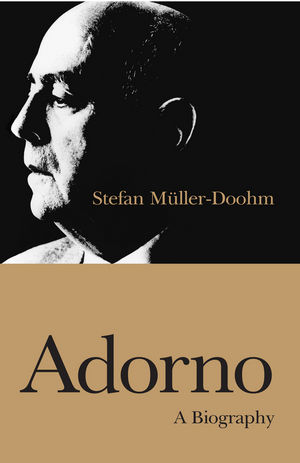Adorno: A BiographyISBN: 978-0-7456-3109-7
Paperback
648 pages
February 2009, Polity
 This is a Print-on-Demand title. It will be printed specifically to fill your order. Please allow an additional 10-15 days delivery time. The book is not returnable.
|
||||||
List of Figures viii
List of Plates ix
Preface xii
Acknowledgements xiv
Illustration Acknowledgements xvi
Part I Origins: Family, Childhood and Youth: School and University in Frankfurt am Main Family Inheritance: A Picture of Contrasts 3
1 Adorno’s Corsican Grandfather: Jean François, alias Giovanni Francesco 5
• Fencing master Calvelli-Adorno in the Frankfurt suburb of Bockenheim 8
2 Wiesengrund: The Jewish Heritage of his Father’s Romantic Name 13
• A generous father and two musical mothers 15
3 Between Oberrad and Amorbach 25
• School experiences of a precocious youth 32
• Arousing philosophical interests in the musical soul: Kracauer’s influence on Adorno 37
4 Éducation sentimentale 52
• First love and a number of affairs 55
Part II A Change of Scene: Between Frankfurt, Vienna and Berlin: A Profusion of Intellectual Interests Commuting between Philosophy and Music 67
5 Against the Stream: The City of Frankfurt and its University 69
• First meeting with Max Horkheimer in the seminar on gestalt psychology 74
6 A Man with Philosophical Qualities in the World of Viennese Music: The Danube Metropolis 82
• Apprenticeship with his master and teacher 83
7 In Search of a Career 95
• Between philosophy and music: no parting of the ways 100
8 Music Criticism and Compositional Practice 110
• Theorizing the twelve-tone method: Adorno’s debate with Krenek 115
9 Towards a Theory of Aesthetics 119
• Rather more than a beginner’s foray into philosophy 125
10 A Second Anomaly in Frankfurt: The Institute of Social Research 132
• Two inaugural lectures 134
• A Privatdozent in the shadow of Walter Benjamin 145
• The Zeitschrift für Sozialforschung and Adorno’s ideological critique of music 150
• In league with Horkheimer against a second school of sociology under the same roof 155
• The opera project: The Treasure of Indian Joe 159
Part III Emigration Years: An Intellectual in a Foreign Land A Twofold Exile: Intellectual Homelessness as Personal Fate 169
11 The ‘Coordination’ of the National Socialist Nation and Adorno’s Reluctant Emigration 173
• Hibernating with dignity? 181
12 Between Academic and Authentic Concerns: From Philosophy Lecturer to Advanced Student in Oxford 187
• Sticks and carrots 194
• An abiding distaste: jazz as a tolerated excess 198
• Setbacks . . . 203
• . . . and personal losses 207
13 Writing Letters as an Aid to Philosophical Self-Clarification: Debates with Benjamin, Sohn-Rethel and Kracauer 214
• A double relationship: Gretel and Max 226
14 Learning by Doing: Adorno’s Path to Social Research 242
• In the Institute of Social Research on Morningside Heights 255
• Between two stools once again: a long road from New York to Los Angeles 267
15 Happiness in Misfortune: Adorno’s Years in California 273
• Messages in a bottle, or, How to create enlightenment about the Enlightenment 278
• Merits of social research: studies in the authoritarian personality 288
• Moral feelings in immoral times 298
• The Privy Councillor: Adorno and Thomas Mann 311
Part IV Thinking the Unconditional and Enduring the Conditional The Explosive Power of Saying No 325
16 Change of Scene: Surveying the Ruins 328
• Playing an active role in postwar Germany? 336
• Back to America: horoscope analysis and TV research 348
• Letting the cat out of the bag: Kafka, Beckett, Hölderlin 353
17 Gaining Recognition for Critical Theory: Adorno’s Activities in the Late 1950s and Early 1960s 366
• In the stream, but swimming against the tide 374
• Speaking of the rope while in the country of the hangman 380
• The crisis of the subject: self-preservation without a self 387
• The purpose of life: understanding the language of music 392
• Right living? Places, people, friendships 398
18 Eating Bread: A Theory Devoured by Thought 412
• The dispute about positivism: Via discourse to the Frankfurt School 421
• Against German stuffiness 430
• The fat child 433
• What kind of a society do we live in? Adorno’s analysis of the present 441
19 With his Back to the Wall 448
• Patricide deferred 457
• The futility of defending a theory as practice 460
• Moments of happiness, despite everything 465
• The divided nature of art 470
• Death 474
Epilogue: Thinking Against Oneself 481
Notes 492
References and Bibliography 615
Index 645



